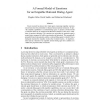Free Online Productivity Tools
i2Speak
i2Symbol
i2OCR
iTex2Img
iWeb2Print
iWeb2Shot
i2Type
iPdf2Split
iPdf2Merge
i2Bopomofo
i2Arabic
i2Style
i2Image
i2PDF
iLatex2Rtf
Sci2ools
AAMAS
2012
Springer
2012
Springer
A formal model of emotions for an empathic rational dialog agent
Recent research has shown that virtual agents expressing empathic emotions toward users have the potentiality to enhance human-machine interaction. To provide empathic capabilities to a rational dialog agent, we propose a formal model of emotions based on an empirical and theoretical analysis of the users’ conditions of emotions elicitation. The emotions are represented by particular agent’s mental states composed of beliefs, uncertainties and intentions. This semantically grounded formal representation enables a rational dialog agent to identify from a dialogical situation the empathic emotion that it should express. An implementation and an evaluation of an empathic rational dialog agent have enabled us to validate the proposed model of emotions.
AAMAS 2012 | Formal Representation | Human Machine Interaction | Intelligent Agents | Virtual Agents |
| Added | 19 Apr 2012 |
| Updated | 19 Apr 2012 |
| Type | Journal |
| Year | 2012 |
| Where | AAMAS |
| Authors | Magalie Ochs, David Sadek, Catherine Pelachaud |
Comments (0)

